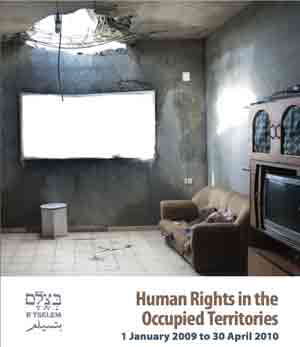New B'tselem report published
Human Rights in the Occupied Territories, 1 January 2009 to 30 April 2010
Below we reproduce the Preface and the List of contents. Download full report
Preface
This publication reviews the status of human rights in the Occupied Territories in the 16–month period between January 2009 and April 2010.
Both chronologically and substantively, a review of human rights during this period must begin with Operation Cast Lead in the Gaza Strip. The extent of the harm to civilians in Gaza as well as in southern Israel, and the severity of the allegations regarding the conduct of Israel and Hamas, dwarf many other human rights concerns.
Since the end of the operation, the human rights situation improved in several important spheres. The number of Israeli and Palestinian fatalities was much lower than in previous years. In the West Bank, Israel removed some of its restrictions on Palestinian movement. The number of administrative detainees held by Israel continued to decline.
In other spheres, however, the violations continued as in the past. Although Israel declared a freeze on construction in the settlements, their impact on Palestinians’ human rights continued and even increased. By its nature, the settlement enterprise discriminates between two populations living in the same geographic area and under the same sovereignty.
An individual’s rights and benefits are determined by his or her nationality, with Palestinians suffering discrimination in a wide range of spheres, from the criminal justice system to freedom of movement and access to water, to the ability to build a house in accordance with fair criteria.
In the Gaza Strip, Israel’s siege continues. The almost total prohibition on the import of raw materials and on exports has led to the collapse of the economy and the closing of most of the factories in Gaza. The restrictions on import of building materials have prevented the reconstruction of buildings that Israel destroyed during Operation Cast Lead. Poverty and deprivation, which were widespread before the operation, have worsened. Absurdly, Israel’s decision to prevent imports and exports has encouraged the development of the tunnels economy between the Gaza Strip and Egypt, which is controlled by Hamas and increases its power.
Despite the widening gap between the reality in the West Bank and that in the Gaza Strip, the impunity with which Israeli forces act in both areas is a common denominator. From the soldier at the checkpoint to the top echelons of the military and government, accountability for harming Palestinian civilians is the exception rather than the rule.
As Israelis, we are deeply committed to ensuring that our own country act morally. I invite everyone who shares this value – government officials and ordinary citizens alike, whether in Israel or around the world – to take part in this vital enterprise. There is much work to be done and the reality is complicated, but in the spirit of Pirkei Avot (the Jewish Ethics of the Fathers): we may not finish the task, but are not free to desist from it. Jessica Montell, Executive Director
______
Contents:
Operation Cast Lead: Hundreds killed, thousands homeless
1.5 Million People Imprisoned: The siege on the Gaza Strip
The Human Toll: Palestinian and Israeli civilians killed since the end of Operation Cast Lead
Sometimes, “a blow. . . is an integral part of the mission”: Violence against Palestinians by Israeli security forces
Discrimination and Land grab in the Service of the State: Settlements in the West Bank and East Jerusalem
Predictable Attacks – Predictable Leniency: Failure to protect Palestinians from attacks by Israeli civilians
Annexation in the guise of Security: The Separation Barrier
A More Comfortable Occupation: Restrictions on Palestinian movement in the West Bank and East Jerusalem
The Planning System: Restrictions, demolitions and overcrowding
Without Trial: Administrative detention

